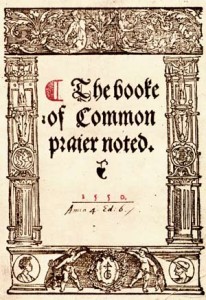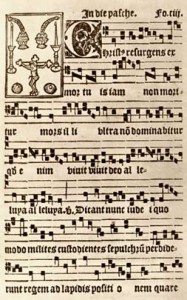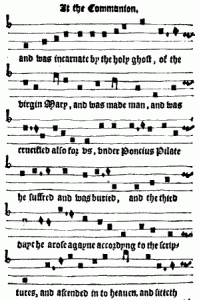At Mount Calvary we have been using John Merbecke’s setting of the ordinary of the mass: the Kyrie, Gloria, Sanctus, and Agnus Dei. In the sixteenth century both Catholics and Reformers disliked church music that obscured the text. The chief offender in chant was the melisma, many notes on the same syllable. Church authorities of all persuasions maintained that the text, the Word, was more important than the music, or at least should be of equal importance. Therefore both Catholics and Reformers proposed limiting music to one note per syllable, as much chant in fact already did.
Sarum Chant with melismas
Catholics were concerned that complicated music, sometimes of a secular origin, was obscuring the text and becoming mere entertainment. The Council Fathers considered banning polyphony for that reason. The legend is that Palestrina composed the Missa Papae Marcelli (1562) in an intelligible, declamatory style and thereby saved polyphony for Catholicism.
In 1607 the composer Agostino Agazzari wrote:
“Music of the older kind is no longer in use, both because of the confusion and babel of the words, arising from the long and intricate imitations, and because it has no grace, for with all the voices singing, one hears neither period nor sense, these being interfered with and covered up by imitations…And on this account music would have come very near to being banished from the Holy Church by a sovereign pontiff [Pius IV], had not Giovanni Palestrina founded the remedy, showing that the fault and error lay, not with the music, but with the composers, and composing in confirmation of this the Mass entitled Missa Papae Marcelli.”
Reformers even more strongly emphasized intelligibility. Therefore the liturgy should be in English and with very simple music. Thomas Cranmer wrote of the musical settings for the new English liturgy:
“But in mine opinion, the song that shall be made thereunto would not be full of notes but, as near as may be, for every syllable a note.”
This continued to be emphasized by Anglicans. In 1571 Winchester Cathedral instructed;
“Item, that in the quire no note shall be used in song that shall drown any word or syllable, or draw out in length or shorten any word or syllable otherwise than by the nature of the word as it is pronounced in common speech, whereby the sentence cannot be perceived by the hearers. And also the often reports or repeating of notes with words or sentences whereby the sense may be hindered in the hearer shall not be used.”
John Merbecke (1510-1585), a chorister and organ at Winchester, was an ardent Protestant and was almost executed under Queen Mary. He followed the new musical policy. Merbecke adopted a very simplified plainchant for his setting of the Book of Common Prayer (1550). It was used only briefly, because under Queen Elizabeth all service music fell into disfavor. Merbecke’s setting of the mass was revived by the Oxford Movement; it is this that we have been using. Some branches of Anglicanism celebrate Merbecke’s feast day on November 21.


